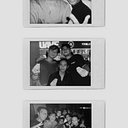Communicating the past, present, and future through a conversation.
Have you ever stopped to think about the power of conversations that span across generations? I certainly hadn’t until my older sister introduced me to the concept of vertical-based conversations. She was always introducing me to people who were much older (10 years above) and more experienced than me, even when I was still in middle school. At the time, I didn’t fully understand the value of speaking with people who were significantly older or younger than me.
When I grew older
But as I grew older and reflected on those conversations, I began to see the benefits firsthand. Not only did I gain valuable insights and perspectives from people who had lived through different experiences and eras, but I also formed meaningful connections and relationships that have lasted beyond the initial conversation. My brother called this concept ‘Cross-generational conversations” or in Indonesia, we called it “Percakapan Lintas Generasi” she believed that this is the best type of conversation.
Even some of my sister’s friends who used to be ‘temporary houses’ for me have now become my friends, and some have even become my life mentors, even if it is not directly. These experiences have shown me the power and value of engaging in vertical-based conversations. They allow us to broaden our understanding of the world and the people of the past or future.
The conversation doesn’t always have to involve talking, speaking, or discussing.
I have often found myself wondering why it seems that everyone insists on reading books. It seems to me that there are many other ways to learn (TikTok, Youtube Short, Instagram Reels, etc.) However, when I keep wondering it also leads me to ask myself more complex and thought-provoking questions. For instance, is it possible to communicate with individuals who have passed away? Some may argue that this can be achieved through spiritual or scientific means, drawing comparisons to concepts such as time travel. While it is true that advances in technology have led to the possibility of communicating with the deceased through certain auras, it seems that this is not a reliable method.
You even can create a one way conversation with a dead person
Instead of relying on unreliable methods of communication, I believe that the most effective way to engage with individuals who have passed away is through their work. By actively reading and studying the books, paintings, sculptures, music, or other creations of these individuals, we can gain a deeper understanding of who they were as people and the impact they had on the world. This allows us to carry on their legacy and continue to be inspired by their ideas and actions, even after they are gone. In this way, reading the work of individuals who have passed away is a powerful and meaningful way to connect with them and learn from their experiences
So, why do we need to discuss and talk about this? It’s because that is the concept of why we learn history — to explore the vertical timeline of our world. We don’t just discuss with friends, but also with our predecessors. The concept of time travel, as I mentioned earlier, supports this idea. If we could fly up and see other areas or people who are even more advanced than us, it would never be wrong to try.
The 110 Billion Human
Just imagine, there have been 110 billion humans who have ever lived. What is the probability that we all want the same thing with someone that ever lived? If we look at humans from the past, they used to hunt and now they work, but that’s just the concept — everything just changes form, but at its core, we are all the same.
We just learn from the decision-making of the past, so we don’t romanticize the idea of “everyone must fail,” but we also have the choice to learn from the failures of others.
